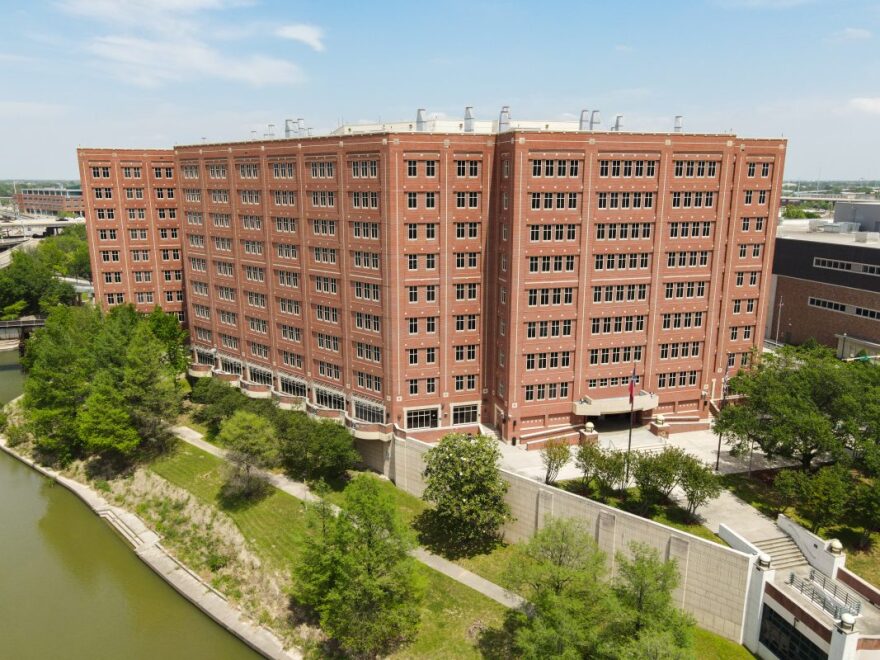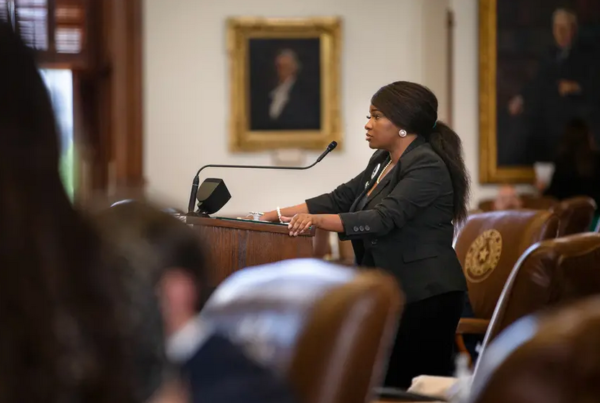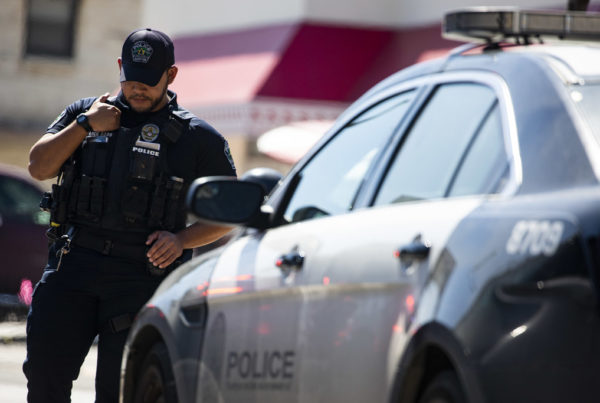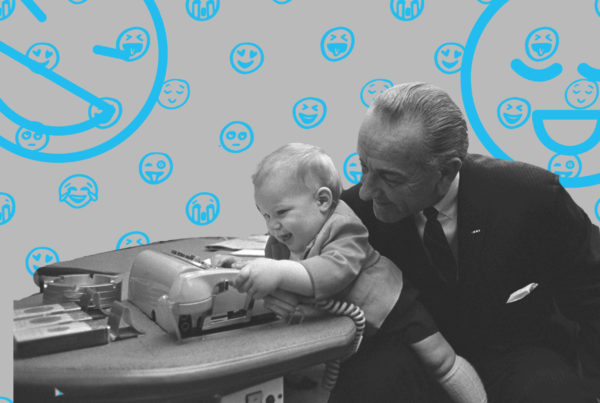The Harris County Jail System is the most violent in Texas based on self-reported assault figures provided by the Texas Commission on Jail Standards.
At one point last year, detainees had a 1-in-10 chance of being assaulted.
Assaults on detainees and guards began to increase in late 2019, jumping 91% in a single month. The rise continued over two years nearly unabated, punctuated by detainee deaths and — most recently — what sheriff officials say was the sexual assault of a female Harris County detention sergeant by a man being held in Harris County detention. Use of force incidents resulting in an injury more than doubled in that same time period.
Staff shortages, overcrowding and a years-long trial backlog worsened by COVID-19 have all added stress to the system. Harris County is facing federal lawsuits from detainees and guards over the situation inside jail facilities. Guards are seeking a federal takeover of Texas’ largest jail.
The number of assaults has begun to fall in recent months, but it’s unclear if the lull will last.
Harris County Sheriff Ed Gonzalez, who is responsible for the jail, has declined repeated requests for comment.
The number of people in Harris County Jail detained for misdemeanors has drastically decreased since a federal judge found the county’s use of cash bail for low-level offenses unconstitutional.
A report from court monitors noted a 60% drop in the number of misdemeanors that needed cash bonds since a consent decree that mandated most people in front of misdemeanor judges be released without paying cash, on personal recognizance bonds.
A counter-effort at the legislature to keep more people accused of violent offenses inside on cash bond. The two taken together has helped change the composition of the offenses keeping people inside. The Harris County Sheriff’s Office estimates that 75% of their detainees are accused of the highest levels of violent offenses.
Harris County’s detention facilities, located at 701 and 711 San Jacinto St. as well as 1200 and 1307 Baker St., lead the state in both raw assault counts and per-capita assault rates, more than doubling other large urban jails.
In early November, a 19-year-old man with special needs was beaten and stabbed to death in the jail. According to news reports, Fred Harris, a 5-foot-8-inch, 98-pound man, was allegedly killed by a man more than twice his size while in a holding cell.
Fred Harris was one of 20 in-custody deaths in Harris County Jail from violence, illness and other reasons, but the vast majority of assaults aren’t fatal.
For Goldie Vanzandt’s husband Jerome, a disabled veteran, it was still very serious. She told a meeting of the Texas Jail Commission last August that when her husband completed his shower at the facility on his first night, he returned to his holding cell to find five men waiting.
“He came back to shower and there were five guys waiting on him to beat him up, take his commissary (and) take his shoes,” she said.
Advocates for detainees have called the situation “a pressure cooker” of stress, anxiety and violence as more than 8,700 men and women languish inside for an average 204 days. State auditors noted tension and hostility among detainees and found the facility out of compliance with minimum jail standards related to hygiene and staffing.
“It is the professional opinion of the members of the inspection team that the lack of sufficient staffing has contributed to the heightened level of tension and inmate hostility at the Harris County Jail System,” auditors said in the report.
A union representative reported state auditors had been threatened while conducting the inspection. TCJS staff did not confirm or deny that allegation.
Detainee programming, access to recreation, and other services are often the first things to be cut when staffing is in question. Some detainees TPR spoke with said they were “in-pod” or confined indoors 24 hours a day, without any access to recreation. One said that they were told TV viewing counted as their recreation time.
Idleness is considered a driver of aggression in jails and it isn’t clear what programming has been cut in which facilities. The sexual assault on a guard occurred as a detainee was allegedly moving between a bible study program and his living pod.
“Idle time can create really difficult situations in a jail environment,” said Sheriff Ed Gonzalez in a December press conference after the assault.

COVID-19 has also made it harder for detainees to see family through visitation.
For some people TPR spoke with, it was largely about getting their day in court.
“We got an influx of people coming constantly. It doesn’t make sense. The (jail) is overcrowded and that’s where the anger is coming from. They don’t want to let anybody go,” said Billy Lewis, a detainee at the 701 San Jacinto facility.
Lewis is accused of drug possession and has been inside since late October. He is in a 28-bed open dormitory and said he spends all of his time inside the pod waiting for his next court hearing, which could be reset, or delayed.
“They constantly resetting people over and over for months at a time,” he said of court dates.
The Harris County court backlog on cases has continued since Hurricane Harvey, getting notably worse since the pandemic began. According to the Harris County District Attorney’s office, those numbers have started to come down since July.
“My next pre-trial date is March 2. They’ve been resetting because they don’t have anything on my case,” said one detainee who didn’t want to be identified but has been inside 701 San Jacinto since 2019.
“My court date has been reset like eight, nine times — probably more than that. That’s probably just my estimate right now,” he said.
Each time he comes close to a trial date, it gets rescheduled. At one point the man who has yet to be found guilty didn’t see a judge for a year.
He doesn’t think highly of his court-appointed attorney who he said has never filed for a bail reduction. It is currently set at $30,000 for his aggravated assault with a deadly weapon charge.
“I’m not eating a lot. This is not a way to do your time at all. In a cell every day for 24 hours, like that is not right,” he said.
The hostility and anger overflowing at the jail has also led to more assaults on jailers. The Harris County Sheriff’s office estimated 1,200 last year. Union figures were higher, the most egregious coming in November with the rape of a jail guard by a detainee who was traveling unsupervised from bible study back to his pod. Harris County allows people accused of nonviolent offenses to travel between secured areas unsupervised. It wasn’t clear whether the man should have been allowed. Texas Commission on Jail Standards said it is not the norm to allow detainees to travel unsupervised. Guards at either end are supposed to communicate to ensure they arrive without issue.
“The staffing crisis that we’re in now has taken away those in-between checks as inmates walk themselves from their cell block to medical or to the church or to church services or to other places. And that’s become a real problem,” said Robin Foster, a lawyer for the Harris County Deputies’ Organization, which represents detention officers.
She agrees that the jail’s guards and detainees feel the stress of the court system backlog extending back to Hurricane Harvey.
Jail reform advocates as well as the Harris County Deputies’ Organization have been warning of potential riot conditions in the facilities for months.
“It’s always concerning when someone mentions the possibility for riot in any county jail,” said Brandon Wood, executive director of the Texas Commission on Jail Standards. “Harris County staff is well aware of our concerns and the concerns that have been brought to them, whether it be by staff, inmates or outside advocates.”
“The lack of sufficient staffing has contributed to the heightened level of tension and inmate hostility that Harris County Jail System that was experienced during the course of this inspection” read the November report.
The report pointed out that while the jail system was technically meeting its one guard to 48-detainee minimum safety ratio, it was pulling staff from other necessary and ancillary areas of the justice system.
“I believe you could describe it as robbing Peter to pay Paul,” Woods said.
The sheriff did request additional staff in the fall of 2021, but it was far below the 500 that the detention officers union said was necessary to avoid catastrophe. After the rape of one of his guards, Gonzalez advocated for more than 500 across his ranks.
In a press conference after the assault on his detention officer he explained the jail for too long had focused on only meeting the minimum standard.
“It’s critical that we exceed minimum staffing,” Gonzalez said. “I think that’s our first. The other thing would be potentially, for us to outsource until we could lessen some of the pressure population wise.”
The county recently finalized its plan to move 500 jail detainees to private detention in Louisiana. Harris County Commissioners approved the idea in mid-December as a way to bring the jail back into compliance with minimum safety standards.
The plan was opposed by Civil Rights lawyers who argued it will extend people’s time in jail before they have had their day in court. Detainees who already struggle to get their court-appointed attorneys to visit them are less likely hundreds of miles away.
“This is going to severely affect the quality of representation. We can’t expect them to be going to Louisiana to visit their clients” said Krishnaveni Gundu, executive director of the Texas Jail Project.
For reformers like Gundu, jails are “engines of violence” and the best way to solve that is to keep people out of them.
Gundu asked why the county didn’t look at additional decarceration options: pushing to release more people accused of low-level offenses and increasing the use of cite and release for certain misdemeanors. She said the District Attorney had record filings in 2021, but questioned if they could prove their cases.
“The DA is accepting charges that often can’t be proved,” said Elizabeth Rossi, an attorney with Civil Rights Corps, an organization that has sued the county jail multiple times over how people are left in jail without trial. Citing 2019 data, she said the county dismissed a third of all of its felony cases and more than two thirds of its misdemeanor ones.
The Harris County DA challenged the interpretation of the data, saying dismissals can mean things like diversion programs.
“I’ve already diverted 15 this morning. That ends in a dismissal,” said Nathan Beedle, chief of the misdemeanor division for the Harris County DA. “That does not mean it’s baseless. It means that somebody has done something in return for a dismissal.”
Beedle also pointed out the county has more people with serious felonies out on bond then at any other time. A reported 150 people were killed by people out on bond last year. Harris County saw 469 murders in 2021.
Independent monitors also found the changes to bail practices in Harris County — that allowed low level offenders out without cash bail did not lead to an increase in rearrests.
These stats complicate the argument for further decarceration.
Beedle was unmoved by the statistics of violence inside the jail.
“Is the solution then to let people charged with aggravated robbery, murder, sexual assault out,” Beedle asked. “How are you going to do that? To where the public’s not going to be at risk?”
Next steps
It is unclear what impact on violence or crowding the 500 transfers to Louisiana will have. The Harris County jail system has almost 1,000 fewer people right now than it did when the union filed its lawsuit in September. The last time the county jail was under 8,000 people was May of 2020. According to TCJS records, the population dropped from 9050 to 7562.
Explanations included fewer arrests due to early Covid quarantines and efforts to decarcerate to avoid mass infections.
Harris County Judge Lina Hidalgo had ordered the release of low-risk offenders, but was stymied by Gov. Greg Abbott.
Abbott used additional powers afforded him to combat the pandemic, to try and bar any judge from releasing anyone accused of or convicted in the past of violence. The executive order known as GA-13 was later struck down by a Bexar County State District Judge but some parts of it were codified under Senate Bill 6.
Going forward there are still questions around the pace of hiring new officers. The Harris County Deputies Organization questioned whether Gonzalez would follow through on his promise of new hires. Others questioned the reality of how fast they could be used.
“I would say maybe the first half of the first few months into the year, we could probably fulfill just guessing around March,” Gonzalez said at a December Commissioners Court meeting.
One jail expert suggested that it should take six to 12 months to process and train many new guards.
“We can’t just hire people off the streets and bring them in, and then put them in charge of other people, with the ability to control whether a person eats, whether a person showers, or a person can sleep, right?” said Andrea Armstrong, an expert on jails and a professor of law at Loyola University New Orleans. “So you have to have a robust training program, including significant modules on deescalation.”
The numbers are not cut and dried
Why is there more violence in Harris County than at other jails?
There are a myriad of reasons the spike could be occurring: fear of a rise of in-custody deaths, fear of contracting COVID-19, overcrowding, staff shortages, the composition of the jail population and others. Experts say without much more data, there isn’t any way to say with certainty.
“I would want to know whether or not there’s adequate supervision in the areas where this is occurring, I’d want to know where it’s occurring,” said Michele Deitch, a senior distinguished lecturer on prison and jail conditions at UT-Austin.
Reports from TCJS don’t show that specificity and the Sheriff’s office declined to answer questions.
Also, the data is incomplete. Harris County has the most assaults, but what counts as an assault varies across institutions. They can range from a push to a fight, and not every organization reports them the same way. Another union representing guards declined to comment on the statistics from TCJS because they didn’t know how the other organization defined its assaults.
A good example is Dallas County. The county detention facilities at times have come close to the same population numbers as Bexar County, but with about 10% of the assault numbers. Dallas does have over a third more beds than Bexar. So while Bexar at times came close to 90% full last year, Dallas remained below 70%.
“There’s always a possibility that Harris County is simply doing a much better job of documenting, tracking and then reporting the assault data as compared to other jails,” said Wood with the Texas Commission on Jail Standards.
Jail reform advocates agree the puzzle is missing pieces. Gundu said county jails are often violent and the Texas Jail Project would never call a jail “the most violent” in the state due to those data shortcomings.
“The unfortunate reality is that the kind of violence reported in Harris County Jail is pretty routine across the state,” she said.
What gets reported is not always the whole story.
“I have answered (calls) from across the state from various types and sizes of county jails, including whistleblower calls from jailers who say there are lots of incidents that go unreported,” she said.














